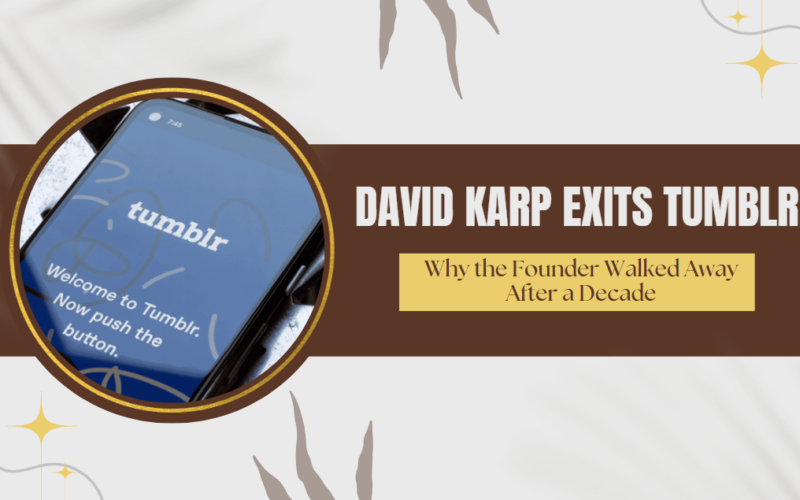Tumblr emerged as a revolutionary microblogging platform in 2007, offering users a unique space to express themselves through multimedia content, short blogs, and creative posts. Unlike traditional blogging sites, Tumblr thrived on simplicity, community engagement, and customization, quickly gaining popularity among artists, writers, and niche communities. Its rise was meteoric, attracting millions of users and eventually catching the attention of major tech giants.
At the heart of this innovation was David Karp, a self-taught programmer and entrepreneur who envisioned a platform where people could share ideas effortlessly. His leadership and vision helped Tumblr grow into a cultural phenomenon, leading to its $1.1 billion acquisition by Yahoo in 2013. However, a decade after founding Tumblr, Karp made the unexpected decision to step down, marking a major shift in the platform’s journey. His departure raised questions about the challenges he faced, the future of Tumblr, and what led him to walk away from his creation at such a crucial time.
The Rise of Tumblr Under David Karp
David Karp founded Tumblr in 2007 with a simple yet powerful idea—creating a platform where users could share short-form content, multimedia posts, and creative ideas without the complexity of traditional blogging. Unlike other platforms, Tumblr encouraged quick, expressive posts, allowing users to customize their pages, follow communities, and interact through reblogs. This unique approach made Tumblr stand out in the social media landscape, offering a blend of blogging and social networking that appealed to a wide range of users.
As the platform gained traction, it became a thriving space for artists, writers, and fandom communities. Its effortless sharing system, combined with an emphasis on visual content, made it a favorite among young, internet-savvy users. By the early 2010s, Tumblr had grown into a major online hub, boasting millions of active users and an unmatched influence on internet culture. Memes, viral trends, and niche communities flourished, cementing Tumblr as a digital powerhouse.
In 2013, Yahoo! recognized Tumblr’s potential and acquired it for a staggering $1.1 billion. The acquisition was meant to bring Tumblr into the mainstream tech industry while providing Yahoo! with a much-needed social media presence. However, while the deal highlighted Tumblr’s success, it also marked the beginning of significant corporate changes—some of which would eventually lead to the challenges that contributed to Karp’s departure.
Challenges and Changes Post-Acquisition
Despite Tumblr’s initial success, its journey under Yahoo!’s ownership was far from smooth. Yahoo! struggled to integrate Tumblr into its broader business model, particularly in terms of monetization. Advertisers found Tumblr’s free-spirited and often unpredictable content challenging to align with traditional marketing strategies. This made it difficult for Yahoo! to generate significant revenue from the platform, leading to internal frustrations and missed financial targets.
The situation worsened when Verizon acquired Yahoo! in 2017, taking control of Tumblr in the process. Under Verizon, Tumblr faced even more challenges, including a lack of clear direction and dwindling user engagement. The corporate shift led to increased efforts to commercialize the platform, but these efforts often clashed with Tumblr’s organic, community-driven nature. As Tumblr struggled to stay relevant in a rapidly evolving social media landscape, user dissatisfaction grew.
One of the most controversial decisions under Verizon’s leadership was the ban on adult content in 2018. Tumblr had long been a space for diverse communities, including artists and activists, who used the platform for creative expression. The sudden policy change led to an immediate backlash, with users accusing the company of alienating its core audience. The ban not only drove many users away but also significantly impacted engagement, causing a sharp decline in traffic. These ongoing struggles and changes created a growing disconnect between Tumblr’s original vision and its new corporate direction—an issue that likely played a role in David Karp’s decision to step away.
Reasons Behind David Karp’s Departure
After a decade at the helm of Tumblr, David Karp’s decision to step down in 2017 was not entirely unexpected. As the platform evolved under corporate ownership, his role as a creative visionary became increasingly constrained. Yahoo!’s acquisition had already introduced significant oversight, but the situation worsened when Verizon took control. With large corporations prioritizing profitability over creativity, Karp likely found himself with less influence over Tumblr’s direction. The very essence of what made Tumblr unique—its organic, user-driven culture—was at risk under corporate decision-making, leaving Karp in a difficult position.
Financial struggles further complicated matters. As user engagement declined due to policy changes and failed monetization efforts, Tumblr faced mounting pressure to become profitable. The inability to effectively generate revenue, coupled with a shrinking user base, may have contributed to Karp’s frustration. The platform was no longer the thriving creative hub it once was, and despite his efforts, he may have felt powerless to steer it back on course.
Additionally, internal conflicts and disagreements over Tumblr’s future likely played a role. As Verizon sought to reshape the platform to fit a more commercialized model, Karp may have disagreed with decisions that clashed with his original vision. Feeling increasingly disconnected from the company he built, he may have realized that staying on would only mean further compromises.
Beyond professional challenges, personal reasons could have influenced his departure as well. After dedicating ten years to Tumblr, Karp may have simply wanted to explore new ventures or take a break from the pressures of leading a large platform. Whatever the exact reasons, his exit marked a turning point for Tumblr, signaling the end of an era and leaving many wondering what would come next for both the platform and its founder.
The Aftermath of His Exit
David Karp’s departure marked a turning point for Tumblr, but unfortunately, the platform continued to struggle in his absence. Without its founder’s vision and leadership, Tumblr faced declining user engagement, ongoing financial difficulties, and a lack of clear direction. Verizon, already struggling to integrate the platform into its larger digital strategy, found it increasingly difficult to manage and sustain Tumblr’s relevance in a rapidly changing social media landscape.
Recognizing its inability to turn things around, Verizon decided to sell Tumblr in 2019 to Automattic, the parent company of WordPress. The acquisition was seen as a potential lifeline, as Automattic had a strong background in blogging platforms and a user-first approach. However, despite hopes of revitalization, Tumblr remained a niche platform, unable to regain its former influence. Many users who had left due to controversial policy changes never returned, and its appeal continued to diminish in comparison to newer social media giants.
As for David Karp, he largely stepped away from the public eye after leaving Tumblr. While he has not launched another major tech venture, reports suggest that he has been involved in philanthropic efforts and advisory roles within the tech industry. His focus has shifted toward personal projects, entrepreneurship, and potentially exploring new ideas outside the corporate constraints he once faced. Though his time with Tumblr ended, his impact on the digital world remains undeniable, as the platform he created helped shape internet culture in ways few could have predicted.
Conclusion
David Karp’s departure from Tumblr marked the end of an era for one of the internet’s most influential platforms. As a visionary, Karp reshaped how people shared content online, creating a space that championed creativity, self-expression, and niche communities. His impact on the tech world goes beyond just Tumblr—he pioneered a form of microblogging that left a lasting mark on digital culture.
However, his exit also signified the challenges of corporate ownership in the tech industry. Without his leadership, Tumblr struggled to maintain its identity, and the community that once thrived under its unique, user-driven approach felt the shift. The platform’s decline after his departure highlights the difficulties of balancing creativity with commercialization, as well as the risks that come with losing a founder’s vision.
Could Tumblr have had a different fate? Perhaps, if it had remained independent or found a more suitable corporate partner, it might have continued to flourish. But regardless of its struggles, Tumblr’s influence on internet culture remains undeniable. And while David Karp has moved on to new endeavors, his legacy as the mind behind one of the internet’s most iconic platforms will not be forgotten.











